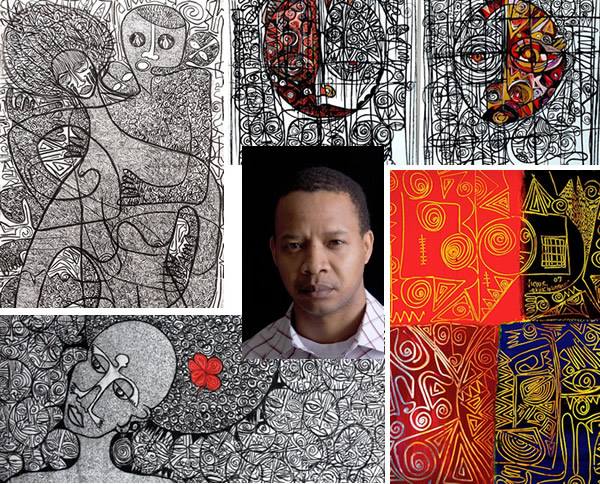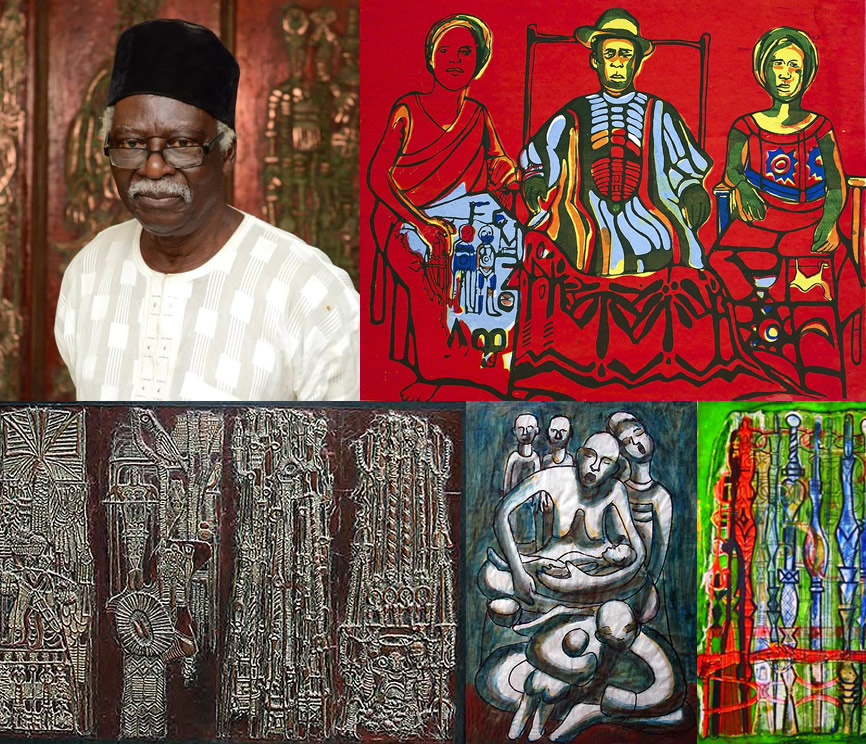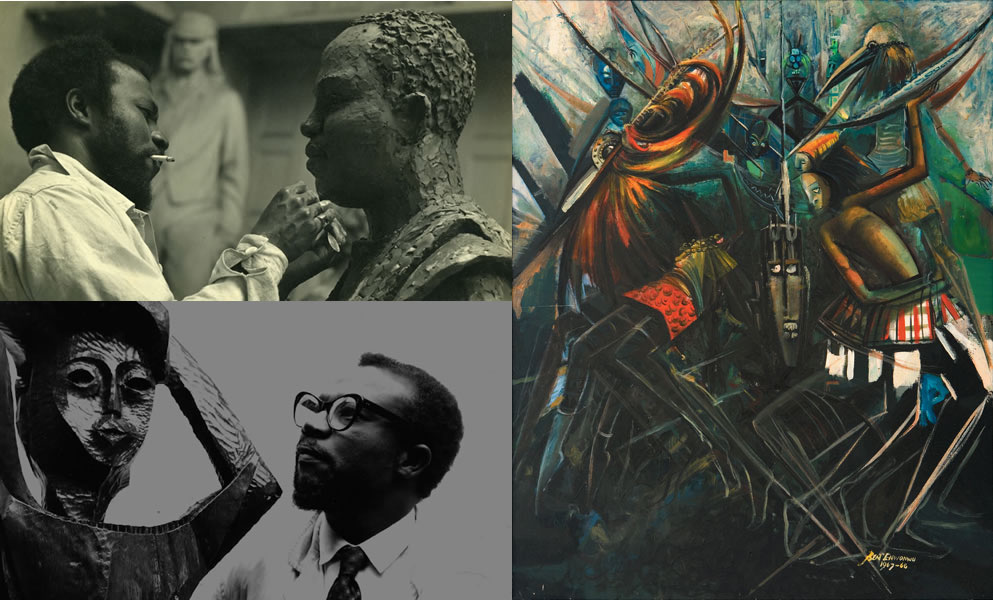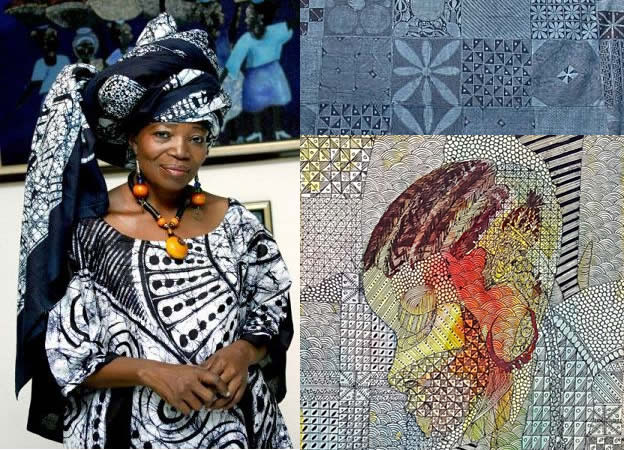Home > Artist on Focus

Ehikhamenor was born in Udomi-Uwessan, Edo State, Nigeria. He was educated in Nigeria and in the United States. He returned from the United States in 2008 to work in Lagos. His work is strongly influenced by work done by villagers especially his grandmother who was a cloth weaver. His uncle was alsoa photographer, his maternal grandfather a blacksmith, and his mother, a local artist. He is also inspired by wall paintings and installation arts, mostly in community shrines. This has been an enduring feature of his work, which is abstract, symbolic and politically motivated; and influenced by the duality of African traditional religion and the interception of Western beliefs, memories and nostalgia.
Ehikhamenor's art and photographs have been used for editorials as well as cover art on books by authors such as Chimamanda Adichie, Helon Habila and Chika Unigwe. They have also been illustrated on fabric and exhibited at international fashion parades.
He has held numerous solo art exhibitions across the world. In 2016, he was one of 11 Nigerian artists invited to join twenty three Indonesian artists in the grand exhibition at the Biennale. At the Jogja National Museum, he showed an installation titled "The Wealth of Nations."
Ehikhamenor has published numerous fiction and critical essays with academic journals, mainstream magazines and newspapers from around the world including The New York Times, CNN Online, Washington Post, Farafina, AGNI Magazine and Wasafiri. His short story, "The Supreme Command", won the Association of Commonwealth Broadcasters Award in 2003. His debut poetry collection, Sordid Rituals, was published in 2002.
His second book, Excuse Me! (2012), a satirical creative non-fiction view of life as an African both at home and abroad, is a recommended text in two Nigerian universities.
Victor Ehikhamenor

Ehikhamenor was born in Udomi-Uwessan, Edo State, Nigeria. He was educated in Nigeria and in the United States. He returned from the United States in 2008 to work in Lagos. His work is strongly influenced by work done by villagers especially his grandmother who was a cloth weaver. His uncle was alsoa photographer, his maternal grandfather a blacksmith, and his mother, a local artist. He is also inspired by wall paintings and installation arts, mostly in community shrines. This has been an enduring feature of his work, which is abstract, symbolic and politically motivated; and influenced by the duality of African traditional religion and the interception of Western beliefs, memories and nostalgia.
Ehikhamenor's art and photographs have been used for editorials as well as cover art on books by authors such as Chimamanda Adichie, Helon Habila and Chika Unigwe. They have also been illustrated on fabric and exhibited at international fashion parades.
He has held numerous solo art exhibitions across the world. In 2016, he was one of 11 Nigerian artists invited to join twenty three Indonesian artists in the grand exhibition at the Biennale. At the Jogja National Museum, he showed an installation titled "The Wealth of Nations."
Ehikhamenor has published numerous fiction and critical essays with academic journals, mainstream magazines and newspapers from around the world including The New York Times, CNN Online, Washington Post, Farafina, AGNI Magazine and Wasafiri. His short story, "The Supreme Command", won the Association of Commonwealth Broadcasters Award in 2003. His debut poetry collection, Sordid Rituals, was published in 2002.
His second book, Excuse Me! (2012), a satirical creative non-fiction view of life as an African both at home and abroad, is a recommended text in two Nigerian universities.
Artist on Focus
Bruce Onobrakpeya

Bruce Onobrakpeya born in Agbarha-Otor, Delta State, Nigeria in 1932, is one of African’s best known and most highly respected artists. A printmaker, painter and sculptor, he has been described as a...
[Continue reading]
Ben Enwonwu

Enwonwu, Benedict (Ben) Chukwukadibia (1921 – 1994) Artist, Painter, Sculptor was born a twin on July 14th, 1921 in Onitsha, Anambra State, Nigeria in to the noble family of Umueze-Aroli in Onitsha....
[Continue reading]
Nike Davies-Okundaye

Chief (Mrs) Nike Davies-Okundaye was born in 1951 in Ogidi-Ijumu, Kogi State, Nigeria. She was brought up amidst the traditional weaving and dying practice in her native village of Ogidi in Western Ni...
[Continue reading]
Yusuf Grillo
Yusuf Grillo (born 1934) is a contemporary Nigerian artist known for his inventive works and the prominence of the color blue in many of his paintings. He was president of the Society of Nigerian Arti...
[Continue reading]
[First Page] [Prev] Page 8 of 8